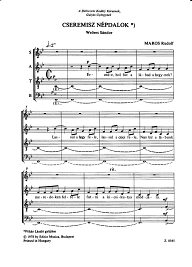The journey of musical works from author to performer
The task of the music publisher is to put manuscripts (be they paper or computerised) into a form that is legible, inspiring, and easy to use for performers; and to ensure the promotion, distribution, and legal use of the works.
With 75 years of experience behind us, we do this honourable work with consideration, commitment, and enthusiasm.
We thank the composers and music teachers who entrust their works to us.
Maros, Rudolf
 He began his career as a pupil of Zoltán Kodály. Although he could sample in 1949 some Western experiments in music at a master’s course held by Alois Hába, the decisive influences on his style were from Kodály and from Bartók, particularly from the discovery of the classicizing tones of the music of Bartók’s final years. Maros, up to the end of the 1950s, became one of the clearest and most successful exponents in Hungary of this folkloristic national classicism.
He began his career as a pupil of Zoltán Kodály. Although he could sample in 1949 some Western experiments in music at a master’s course held by Alois Hába, the decisive influences on his style were from Kodály and from Bartók, particularly from the discovery of the classicizing tones of the music of Bartók’s final years. Maros, up to the end of the 1950s, became one of the clearest and most successful exponents in Hungary of this folkloristic national classicism.
After the 1956 Revolution, Hungarian music moved steadily closer to West European models, which had been dismissed hitherto. Maros was among the first to apply knowledge of the expressionist Bartók, and of Webern, the Polish avantgarde and the Darmstadt serialists, to re-learning composition techniques and breaking with Hungarian traditions of the first half of the century. His first Western-style orchestral works ‒ the three Euphonies (1963‒65) ‒ sought a modern orchestral sound and came to serve as a model to be followed in Hungary. Yet his strong attraction to Hungarian tradition turned him back to more conservative composing from the 1970s onwards. In a word, his life’s work in orchestral and chamber music marked an attempt to balance modernity and tradition.
Biography
He died on 3 August, 1982 in Budapest.
His prizes and awards
Erkel Prize (1954, 1955 and 1957); Merited Artist of the Hungarian People’s Republic (1973); Outstanding Artist (1980)
 Deutsch
Deutsch English
English Español
Español Français
Français Magyar
Magyar Română
Română Slovenský
Slovenský Slovenščina
Slovenščina 中文
中文






















